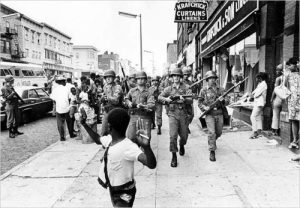It wasn’t Selma. But it was Detroit. It was very public. But, for me, it was deeply personal.
There were two days of inner city rioting just after Martin Luther King’s assassination. And as, if not more importantly, the previous summer (1967) the Detroit police provoked inner city black residents to engage five days and nights of bloody rioting, which became known as one of the deadliest and most destructive social insurgencies in US history.
I was born at Harper Hospital, a hospital, still thriving, in the inner city of Detroit. Most of my early childhood was spent in Detroit, although my family moved to Huntington Woods, a mostly Jewish suburb just north of the city, the summer before I started second grade. Though I now lived in the Woods, I continued to spend a considerable amount of time with my both sets of grandparents, who remained in Sherwood Forest, a neighborhood in the city. My early years were spent growing up there, in Detroit. Specifically, near Livernois and 7 mile, which was a buzzing place back then. I adored my time there. There were so many favorite places; Don’s pharmacy, Brown’s dairy, The Butcher shop, West & Co. clothing store, Rainer’s pastry shop, Cunningham’s on one corner and Woolworth’s across the street, and Les’s filling station, where a gallon of gas cost 38 cents, when I was seven.
But these wonderful memories were tinged with confusing and embarrassing moments that I picked up on, feeling them but not understanding what was going on. Moreover, I felt that I was the only one who felt this way. My mother, and both of my grandmothers, had ‘help’ who came once or twice a week to clean, do laundry, including ironing and more. All of these women were required to wear a maid’s uniform. This evident demarcation between ‘us’ and ‘them’ impacted me, even though I was unaware of what it meant to ‘the help’ and to my family. Cringing doesn’t’ come close to how I felt when my grandmother pushed her foot on the buzzer underneath the dining room table to call Annas in from the kitchen to do whatever; clear dishes etc. But, from the time I was 6 until 11, I could pick up enough to know not to even ask the question. The disparity between ‘us’ and ‘them’, especially the way they were treated, was both palpable to me and what moved me the most. It was baked into my being at a young age, well before I had the wherewithal to truly comprehend what I was witnessing, much less the courage to question it.
Annas, and her husband Clifford, who I adored, worked for my paternal grandmother. Clifford was seldom inside the home, but Annas could regularly be found in the kitchen. I loved Annas, a heavy set older woman with a heart of gold. She radiated kindness and warmth. Helen, who worked for my maternal grandmother, was a bit more reserved but I enjoyed sneaking off to be with her alone so I could learn at least a little bit about her life and her daughter, who I, of course, never had an opportunity to meet. There was also Bessy, who worked for us for a time and then for my paternal grandmother after Annas left. Bessy was quick witted and personable, though I didn’t get to know much about her personal life. Then, came Arvella. Arvella, was special. In part, because she’d let me eat as many Pepperidge Farm cookies as I wanted, when I came home from school famished. My mother bought them but she would only permit me to eat a single cookie! Mind you, I’ve always been thin. Arvella, of course, let me eat as many as I wanted, as long as we agreed I was unlikely to get caught. Thankfully Arvella never got in trouble. Around this time, I started listening to the Detroit’s radio stations that played R & B, and soul; WJLB FM, Keener 13 AM and CKLW AM. I loved the same music that Arvella did. This is how I learned that she was a close friend of Aretha Franklin. In all, these women were kinder to me than my own mother. Little wonder I was seeking a surrogate.
When I started second grade, I was old enough to go to friends’ houses for after school play dates. There, I realized that we weren’t the only ones in the Woods to have ‘help’. Some of the wealthier families even had ‘live-in’ ‘help’. I always wondered how many blocks they had to walk to catch that bus going north on Woodward Avenue getting off at 10 ½ mile and then walking all the way to homes in the Woods. I never knew. Nor, did I feel I could ask. They came to our house rain, sleet or snow. They seemed to do everything but grocery shop. I instinctively believed they were paid a pittance because I sometimes overheard them ask for ‘car fare’. I gathered that had they owned cars, they likely would have been employed in a different profession.
I noticed others kept a distance, but I didn’t come close to understanding the basis for this. Unlike my younger brothers, I made an effort to get to know who these women who were so unflinchingly loving, kind and generous. Not only did I yearn to feel even close to them, but it felt wrong not to engage with them, as long as I didn’t pull them away from work. They meant a lot to me and I was I deeply curious about their lives away from my home. Did they have a families? Children? How long was their commute? Were they getting by? I dared not ask. It felt like forbidden terrain, so I remained silent. Still, I felt a strong allegiance with these women. The only difference I felt between us was age.
The 1967 summer riots in Detroit hit me hard when I first learned about them after arriving home from eight week sleep over camp. I feared for the safety of the families of all these women. I worried because the adults said nothing and I was unable to actually find out on my own. Even though Helen, Bessy and Arvella still came to work, I didn’t feel I could ask them such personal questions, and so I never did learn how their families fared.
1967 also marked the year of the great white flight from Detroit and my family was no exception. One grandmother moved to a high rise apartment not far from Huntington Woods. My other grandmother remained in Sherwood Forest, but for only a year. For the many years I stayed with her, we were friendly with our Jewish neighbors on both sides of her fabled house. I played often with the Ginsburg girls next door when I came to visit. But come 1968, an African American doctor and his family moved into a house across the street. And, nope, we did not welcome the new family to the neighborhood, bringing over flowers or cookies. They were strangers. I recall feeling deeply uncomfortable about this absence of a warm welcome. But alas, this particular discomfort didn’t last, as my grandmother and dad, bought a house in Huntington Woods, so that my dad could be close to me and my brothers. By that time he had divorced my mother.
Around fifth grade, now an adolescent, I became more aware of the world around me. I began reading the newspapers and a deeper level of curiosity kicked in. I also started reading as many black writers as I could get my hands on; Dick Gregory, Richard Wright, Malcolm X, James Baldwin etc. I was learning a lot that wasn’t taught in school. Reading indulged me with the vicarious feeling that I too was taking part in the struggle for civil rights, equal rights, even though I clearly wasn’t doing anything. I hated that I was too young to truly participate in any of the protests. By now, I was aware of a rather subliminal unconscious racism that seemed pervasive within my family and amongst many of the adults I knew. I knew my grandmothers were kind to their ‘helpers’ but I realized a distance and separation were maintained. I, on the other hand, felt a kinship with them that no one around me seemed to share.
1968 was an emblematic year of potent struggles for civil rights, coupled with the notorious Democratic Convention in Chicago, epitomizing youth protests over the war in Vietnam. It ignited a latent need in me to help those struggling to survive in the inner city of Detroit.
And so, here we are again, in Chicago decades later. The stakes are as high, if not arguably higher. Protests are inevitable, given the tragedy of Gaza and the Israeli war. But Chicago is a city rich in history and emotion. It’s the city from which FDR and Bill Clinton emerged as heroes in their time. Obama came home to Chicago to deliver one of the most compelling speeches of his career in Grant Park. With hope and hard work, perhaps history will be made and so too a shrinking of racial disparities, if not the saving of democracy itself.
1968 will always be seared in my heart.






